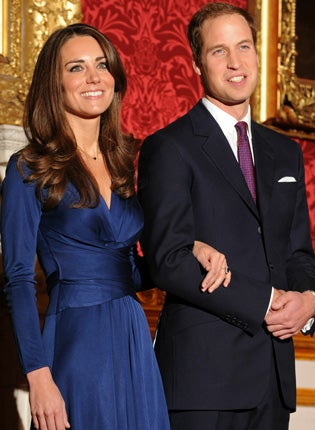Two thirds of Britons are feeling underwhelmed by Royal Wedding

Your support helps us to tell the story
From reproductive rights to climate change to Big Tech, The Independent is on the ground when the story is developing. Whether it's investigating the financials of Elon Musk's pro-Trump PAC or producing our latest documentary, 'The A Word', which shines a light on the American women fighting for reproductive rights, we know how important it is to parse out the facts from the messaging.
At such a critical moment in US history, we need reporters on the ground. Your donation allows us to keep sending journalists to speak to both sides of the story.
The Independent is trusted by Americans across the entire political spectrum. And unlike many other quality news outlets, we choose not to lock Americans out of our reporting and analysis with paywalls. We believe quality journalism should be available to everyone, paid for by those who can afford it.
Your support makes all the difference.The majority of Britons feel indifferent about the announcement that Prince William is to marry Kate Middleton next spring, according to an opinion poll carried out for The Independent.
The ComRes survey found that 31 per cent of people say they "couldn't care less" about the Royal Wedding. And 28 per cent describe themselves as "largely indifferent" with the same proportion being "fairly excited" but only 11 per cent are "very excited". Overall this means that 59 per cent of people can be described as "not excited" and only 40 per cent "excited". There is a significant "gender gap": 50 per cent of women are fairly or very excited, but only 29 per cent of men are.
According to ComRes, the monarchy remains popular but the British people want to see it change with the times. Some 57 per cent believe the Royal Family needs to modernise more quickly while 36 per cent do not.
Support for change is higher among the bottom DE social divisions (64 per cent) than in the top AB groups (47 per cent).
The poll found that one in three people (32 per cent) think Britain would not be any worse off if it became a republic, although 57 per cent disagree with this statement. Backing for a republic is higher among Labour voters (37 per cent) than among Liberal Democrat voters (28 per cent) and Conservative Party supporters (22 per cent).
Three out of four people (76 per cent) are proud that the UK is a monarchy, while 19 per cent are not. Support is higher among people aged 65 and above (85 per cent) than among 18-24 year-olds (69 per cent).
A similar proportion (74 per cent) believes the monarchy has more positive aspects than negative, while 20 per cent disagree. Some 87 per cent of Tory and Liberal Democrat supporters regard it as having more positive than negative traits, but only 70 per cent of Labour voters agree.
The survey also found that Labour has opened a four-point lead over the Tories, its biggest since ComRes began polling for The Independent in 2006.
Labour is on 40 per cent (up two points since the most recent ComRes survey for The Independent on Sunday just over a week ago) and the Tories are on 36 per cent (down one point). The Liberal Democrats are on 12 per cent (down one point) – the same as the minor parties combined percentage (unchanged). The new poll would give Labour an overall majority of 38 if the result was repeated at the next general election.
Support for the Liberal Democrats is now at its joint lowest level since ComRes began polling for this newspaper. The only other time it fell as low as 12 per cent was in November 2008.
Since entering the Coalition with the Tories, Nick Clegg's Liberal Democrats have now "lost" a remarkable 43 per cent of the supporters who voted for the party at the May election. One in four (26 per cent) of them say they would vote Labour if an election was held now, while only just over half (57 per cent) would still back the Liberal Democrats.
The Tories are in the lead among men but trail Labour among women. Labour is ahead among all age groups except those aged 65 and over. The Tories have the advantage in the AB social group but are behind in all the other groups.
ComRes telephoned a random sample of 1,006 British adults between November 26 and 29. Data was weighted to be representative of all adults and by past vote. ComRes is a member of the British Polling Council and abides by its rules. Full tables at www.comres.co.uk
Join our commenting forum
Join thought-provoking conversations, follow other Independent readers and see their replies
Comments